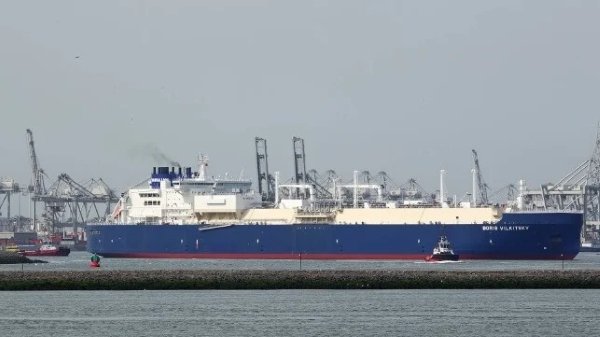
image courtesy Kees Torn / CC BY SA 2.0
Published Mar 7, 2022 1:18 AM by The Maritime Executive
Dockworkers at several facilities in the UK are refusing to handle Russian oil and LNG, prompting multiple ships to divert or wait at berth. The disruption is part of a growing public backlash against Russian energy cargoes in the wake of the Kremlin's decision to invade Ukraine, and the widespread recognition that these cargoes are a potential means of exerting pressure on Russia. Taken together, oil, gas and coal represent about two-thirds of Russia's export economy.
At the Birkenhead Docks, the German-owned and -flagged tanker SeaCod encountered an unexpected challenge when terminal workers refused to help offload her cargo of Russian crude oil.
The SeaCod loaded a cargo of petroleum at the Primorsk terminal outside of St. Petersburg on February 22, and she arrived at Birkenhead on March 2. During the middle of her voyage, Russia invaded Ukraine, prompting massive Western sanctions measures and widespread public condemnation.
Several dockers' unions have expressed an unwillingness to handle Russian cargoes due to the ongoing invasion, and the longshore crew at the Birkenhead Docks shared this view. Though Russian cargoes are not technically banned in the UK - only Russian ships - the crew refused to unload SeaCod's oil. SeaCod returned to sea on March 6, broadcasting "for orders." It is not known how much (if any) of her cargo she offloaded before departure, but her AIS broadcast draft was 24 feet - far less than her fully laden draft of 36 feet.
Essar Group, the buyer of the cargo, said in a statement that it has been working to find non-Russian alternatives. It noted that it has recently turned away two cargoes of non-Russian crude carried by Russian-flagged tankers, and that the SeaCod was cleared to arrive by the local port authority.
Russia supplies about 30 percent of Europe's crude oil supply, and disconnecting from its petroleum exports is already proving challenging. Last week, Shell purchased a deeply-discounted cargo of Russian crude oil from Trafigura, paying $28.50 per barrel below market rate - one of the biggest discounts on record. In a statement, the oil major said that it had to buy the cargo to ensure adequate supply, and the superb profitability of the trade will not be booked: the proceeds will be donated to charities serving Ukraine.
LNG cargoes from Russia face similar challenges on the waterfront. The icebreaking LNG carrier Boris Vilkitsky departed Yamal LNG the day after the invasion, bound for the LNG terminal on the UK's Isle of Grain. After union dockers at the facility refused to unload Russian LNG, she headed to Montoir-de-Bretagne, France, where she was met by Greenpeace protesters. The activists hailed the Vilkitsky's crew over VHF and asked them not to deliver their cargo, since a portion of the proceeds from the sale will flow to the Russian government.
Alors que les responsables politiques européens, dont le gouvernement français, condamnent l’attaque de la Russie contre l’Ukraine, les importations de gaz et de pétrole russes n’ont toujours pas cessé. @TotalEnergies ne fait pas exception. #LaHonteTotal pic.twitter.com/JSi44k2naG
— Greenpeace France (@greenpeacefr) March 5, 2022
Though less often in the spotlight, Russian coal is also encountering a public-relations backlash. Germany imports about 20 million tonnes of coal from Russia every year, and it gets about half of its coal product imports from Russian suppliers. To protest both the use of coal and the use of the proceeds of its sale, Greenpeace activists in Hamburg met the bulker Grant T on its arrival from Russia on March 4. They painted the phrase "No Coal, No War" along its hull as it proceeded in to its destination.
20 activists protest against Russian coal imports.
— Greenpeace e.V. (@greenpeace_de) March 4, 2022
Coal, oil and gas are not only financing war, they are also driving us deeper into the climate crisis.
Fast transition from fossil fuels to renewables = higher chances for a secure future for all people.#Fossilfreerevolution pic.twitter.com/9LOTTD8NlC
Top image: Boris Vilkitsky (Kees Torn / CC BY SA 2.0)
Source www.maritime-executive.com





.jpg)




